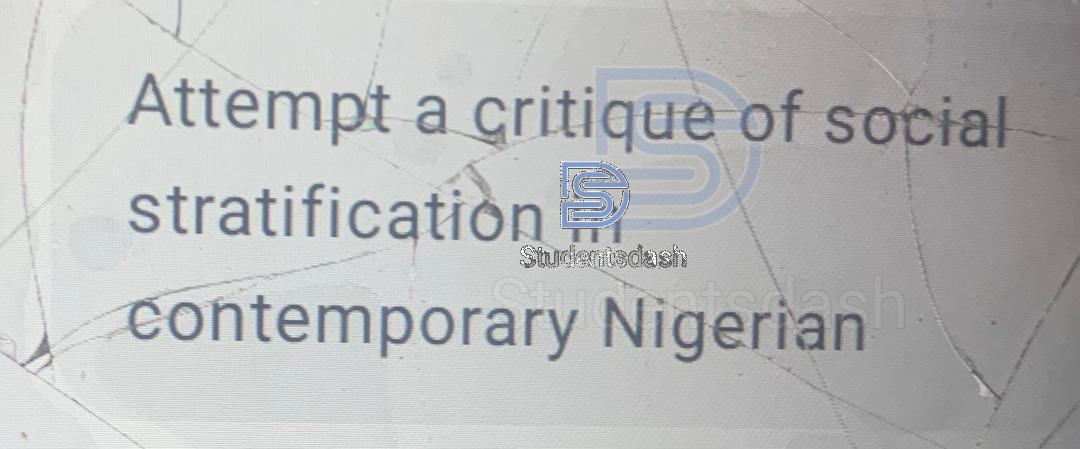HIR 416 Assignment Questions and Answers 2025

Assignment
Choose the theory of history which makes the most sense to you.
Give detailed reasons for your choice. 4 foolscap Pages. Handwritten. Submit on Wednesday, 20thAugust 2025 to the Course Lecturer in person
With the Studentsdash App You can read more on the History and even the whole course content on the HIR 416.
Answer
Introduction
History is more than just a record of past events; it is a reflection of the struggles, ideas, and structures that shape human life. Different scholars have tried to explain why events happen and why societies change over time. Some see history as a series of cycles, where events repeat themselves, while others view it as a straight line of progress or as the story of great individuals.
Among all these theories, I find the Marxian or Economic Theory of History the most convincing. This theory emphasizes that the material conditions of society—how people produce, distribute, and exchange goods—are the foundation of all social, political, and cultural developments. History, according to this view, is driven by class struggle and economic forces, and understanding these forces allows us to see the patterns of change in human society.
The Marxian perspective not only explains why inequality and conflict emerge but also highlights the potential for transformation through collective effort. In this essay, I will explain the theory in detail, illustrate why it resonates with me, compare it briefly with other theories, and reflect on how it helps make sense of human history.
Explanation of the Marxian / Economic Theory of History
The Marxian or Economic Theory of History was developed by Karl Marx (1818–1883) and later expanded by Friedrich Engels. At its core, this theory sees economic factors as the primary drivers of historical change. According to Marx, the way a society produces and distributes goods—the mode of production—shapes its social structures, political systems, and even cultural beliefs.
Marx argued that human history is a history of class struggles. In every society, there exists a ruling class that controls the means of production—factories, land, and resources—and a subordinate class that provides labor. This imbalance inevitably leads to conflict, which is the engine of historical transformation. For example, in feudal Europe, the struggle between lords and peasants eventually led to the rise of capitalism, where the bourgeoisie replaced the feudal elite.
The theory also introduces the concept of base and superstructure. The economic base, which includes production and labor relations, determines the superstructure—politics, law, religion, and ideology. In other words, the ideas and institutions of society are shaped by material conditions. Marx famously disagreed with Hegel, arguing that it is material conditions, not ideas, that shape history.
Marxian theory predicts that the struggle between classes will continue until the oppressed class—the proletariat—overthrows the ruling class, leading to a classless society. This focus on economics and social conflict makes the theory powerful for explaining why societies evolve the way they do, and why inequality and revolution appear repeatedly throughout history..
Reasons for Choosing the Marxian / Economic Theory
I find the Marxian theory of history the most convincing because it explains historical events through the lens of real, material conditions rather than abstract ideas or the actions of a few individuals. Human societies are shaped by economic relationships, and understanding these relationships helps us see the roots of inequality, conflict, and social change
Firstly, the theory resonates with reality because economic struggles are visible in every society. Wars, revolutions, and social reforms often occur when one class is oppressed by another. Marx’s analysis helps make sense of events like the French Revolution, the rise of industrial capitalism, and the labor movements of the nineteenth and twentieth centuries. It highlights that these changes are not random but are driven by underlying economic forces.
Secondly, I appreciate the theory’s focus on the collective rather than the individual. Unlike the “Great Man” theory, which credits history to powerful figures, Marx shows that the actions of ordinary people—the working class—are central to shaping society. This view is empowering because it suggests that change is possible when people act together to challenge unjust systems.
Finally, the Marxian perspective provides a framework for understanding modern issues such as economic inequality, exploitation, and social injustice. By examining who controls resources and wealth, we can see why certain social problems persist and what might be done to address them. This makes history not just a story of the past, but a tool for understanding and improving the present and future.
In short, the Marxian theory appeals to me because it combines clarity, realism, and relevance, showing that history is shaped by forces we can observe, analyze, and, potentially, transform.
Comparison with Other Theories of History
While many theories attempt to explain history, the Marxian theory stands out for its focus on material conditions and class struggle.
1. Great Man Theory:
The Great Man Theory argues that history is shaped by powerful individuals such as rulers, warriors, or inventors. While it highlights important figures, it ignores the role of ordinary people and social structures. Marxian theory, in contrast, emphasizes that history is driven by the collective struggle of classes, showing that individuals act within broader economic and social forces.
2. Everyman Theory:
The Everyman view sees history as the story of ordinary people’s lives. Although it values collective experience, it lacks a clear explanation for why societies change over time. Marxian theory provides a structured framework: social change happens as a result of conflict between classes over control of the means of production, giving Everyman’s experiences context and causality.
3. Cyclical and Linear Theories:
Cyclical history sees events repeating in patterns, while linear history views progress as a gradual unfolding. Both are too abstract and generalized, sometimes ignoring the material forces behind events. Marxian theory explains historical patterns through concrete economic relations and class conflict, offering a cause-and-effect logic rather than assuming fate, destiny, or a predetermined order.
4. Speculative and Teleological Theories:
Speculative or teleological approaches often interpret history as guided by divine plans, fate, or ideas. These theories can be detached from observable reality. Marxian theory, however, roots historical analysis in observable social and economic factors, making it practical, testable, and relevant to contemporary issues.
In essence, while other theories may focus on individuals, ideas, or abstract patterns, the Marxian perspective provides a clear, structured, and realistic explanation of how societies evolve. It integrates the experiences of ordinary people, material conditions, and social conflict to show why historical change occurs.
Conclusion
In conclusion, the Marxian theory of history provides the clearest and most convincing explanation of human society and historical change. By focusing on economic conditions, class struggles, and material realities, it reveals the forces that shape societies and drive transformation. Unlike other theories that emphasize individuals, abstract ideas, or divine plans, Marxian theory examines the root causes of social conflict and inequality, making it both realistic and relevant.
This theory not only helps us understand the past but also offers insights for the present and future. It encourages us to analyze the structures of power, question social injustices, and recognize that ordinary people, acting collectively, have the ability to bring about meaningful change. For these reasons, I find the Marxian theory of history the most logical, insightful, and empowering approach to understanding the story of humanity.

